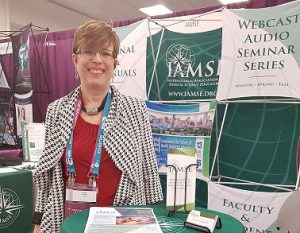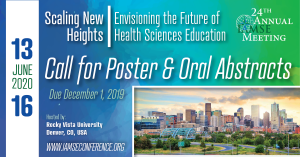News
Opportunities for Sponsorship at #IAMSE20 in Denver
IAMSE is delighted to invite you to exhibit at the 2020 IAMSE Annual Meeting on June 13-16, 2020 in Denver, CO, USA. As partners in medical education and healthcare, we offer exhibit space to commercial, non-profit and academic exhibitors in health professions education. The IAMSE meeting is a perfect place to display educational products and services and engage with meeting participants from around the world. We look forward to meeting our much-valued previous exhibitors again, as well as welcoming our first-time exhibitors. This exhibitor prospectus contains all exhibition package information, along with additional sponsorship opportunities.

Patron Exhibitor – $2,500
- Two registration fees will be waived including all scheduled meals, breaks, receptions, social events and conference dinner
- Two draped tables with two chairs are provided
- Company brochure or literature sheet in each registrant’s packet
- Company logo with hyperlink on the meeting website and company logo in the published program book
Supporter Exhibitor- $1,750
- One registration fee will be waived including all scheduled meals, breaks, receptions and social events
- One draped table with two chairs is provided
- Company brochure or literature sheet in each registrant’s packet
- Company logo with hyperlink on the meeting website and company logo in the published program book
Non-Profit Discipline-Based Society – $1,000
- One registration fee will be waived including all scheduled meals, breaks, receptions and social events
- One draped table with two chairs is provided
- Company brochure or literature sheet in each registrant’s packet
- Company logo with hyperlink on the meeting website
Contributor – $750
- One unmanned display table where your materials will be on display
- Company brochure or literature sheet in each registrant’s packet
- Company logo with hyperlink on the meeting website
IAMSE offers several opportunities to financially support activities during the meeting, such as a keynote lecture, a lunch meeting or a refreshment break. Sponsorship of an activity includes the listing in all printed and digital scheduling materials as well as signage at your sponsored activity. For more information on these a la carte options, as well as registration for the 2020 meeting in Denver, can be found in our brochure here.
Registration for the IAMSE Winter 2020 Webcast Audio Seminar Series is Now Open!
Registration is now open for the IAMSE Winter 2020 Webcast Audio Seminar series. Sessions begin on January 9, 2020.
How is Health Science Education Tackling the Opioid Epidemic?
The opioid epidemic poses a multifaceted challenge, but health science education is playing a significant role in combating this health care crisis. With the development of innovative curricula in pain management and substance abuse. The Winter IAMSE web-based seminar series will provide a comprehensive synopsis of these efforts to respond to the opioid crisis. After an introduction to the topic, the audience will learn about successful health science curricula that expand on existing coursework. Interprofessional education (IPE) is a crucial contributor to improved health outcomes, and the series will include a presentation on IPE that addresses the opioid crisis. The series will include an introduction to curricula about alternative and non-pharmacological approaches to pain management and conclude with a presentation on issues of substance abuse from a student affairs perspective. At the conclusion of this series, participants will have an in-depth understanding of the current educational strategies in response to the opioid epidemic including challenges and opportunities. Furthermore, the series will provide hands-on tips for participants wishing to develop or expand existing pain management curricula within their institutions.
Join us for each one-hour session beginning January 9, 2020 at 12PM EST.
Register Your Institution for the Series!
Register Yourself for the Series!
January 9, 2020 at 12PM Eastern – Responding to the Opioid Crisis: An Educator’s View
January 16, 2020 at 12PM Eastern – Using Undergraduate Medical Education to Increase the Number of Physicians Prepared to Prescribe Medication-Assisted Treatment
January 23, 2020 at 12PM Eastern – Methods for Incorporating Opioid Education into Health Professions Curricula
January 30, 2020 at 12PM Eastern –”Spinal Manipulation and Opioids: Navigating the Current Treatment Landscape” and “Reduce or Eliminate the Need for Opioids by Instituting Scientific Integrative Medicine as First-line Care.”
February 6, 2020 at 12PM Eastern – Medical Students and Substance Use: Challenges and Supports
For additional information or questions, please contact us via email at support@iamse.org
And the best part is
IAMSE Student Members Register FREE!
For more information on the series, student discount code or to register for individual sessions, contact support@iamse.org.
Educational Scholarship Grant Applications Due January 15
As a reminder, IAMSE is currently accepting applications for the IAMSE Educational Scholarship Grant program. The deadline for submitting applications is January 15, 2020. Applications are to be submitted on the submission page found here before the deadline. Instructions for grant proposals may be found here.
All IAMSE members are eligible to submit a grant proposal. Preference will be given to new projects, and must be relevant to the mission of IAMSE. The results of funded projects must be presented at a future IAMSE meeting. The initial funding award will be announced via email, and at the 2020 IAMSE meeting.
Applications Now Accepted for Faculty & Student Travel Awards Deadline December 15
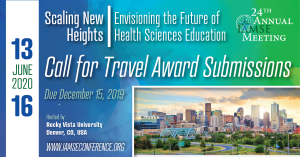
The IAMSE Conference Travel Awards support students or junior faculty to attend the IAMSE Annual Meeting. The amount of the 2020 Travel Awards will be up to $1,500, and are meant to cover expenses related to attendance at the IAMSE annual meeting in Denver, such as conference registration, lodging, and airfare. Any IAMSE member who will attend the 2020 Annual Meeting is eligible to apply, though awards will only be granted to those with an accepted poster, oral or focus session abstract. Students are especially encouraged to apply.
IAMSE Board of Director Nominations Still Being Accepted
As a reminder, IAMSE is currently seeking nominations and self-nominations of candidates to serve on the IAMSE Board of Directors. International members are particularly invited.
The Board of Directors is the governing body that determines the direction of IAMSE and all our various programs and activities. This Spring, three of the Director positions become subject to election. The term for an IAMSE Director is for three years, renewable once.
The formal “job descriptions” for IAMSE Director are posted here. To submit your nomination or self-nomination by November 20 at 5 PM ET, please click here.
Thank you,
IAMSE Nominating Committee
A Review from Medical Science Educator from Dr. Kelly Quesnelle
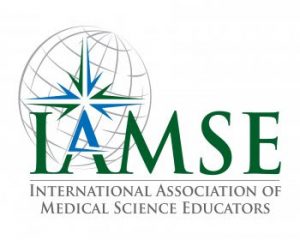
This month the IAMSE Publications Committee review is taken from the article titled Difficulty and Discriminative Ability of Various Categories of Multiple Choice Questions in Medical School Preclerkship Examinations published in the Medical Science Educator, Volume 24, (pp 387-393), by Stanley J. Nazian and Frazier T. Stevenson.
Experienced writers of medical science examination items can easily agree that not all multiple choice vignette questions are created equal. The more pragmatic question is: does vignette complexity matter when measuring outcomes? Stanley Nazian and Past IAMSE President Frazier Stevenson examined part of this question in their 2014 work published in Medical Science Educator, where they describe an investigation on vignette complexity as it relates to assessment item performance on internal course examinations.
Nazian and Stevenson categorized all examination questions in their preclinical medical course examinations as one of four question types: recall, pseudo-vignette, vignette 1, or vignette 2. Recall questions feature strict recall of information with no vignette. Pseudo-vignette questions contain a vignette to place the recall item into a real-world context, but the vignette is not required to answer the question correctly. Vignette 1 and Vignette 2 questions are those where a student must derive one or two pieces of information from the vignette, respectively, in order to answer the question correctly.
The authors describe the distribution of these question types across both preclinical competencies (e.g. immunology-infectious disease, pharmacology, etc.) and specific didactic courses (e.g. Neurological, Cardiovascular and Pulmonary, etc.) in their curriculum. They then determine the differences in difficulty, discrimination index, and point biserial correlation coefficient across the different question types in year 1 versus year 2.
This is an important work, and one worth digging back a few years to revisit because there has not been a tremendous amount of follow up on this topic at other schools despite an increasing reliance on vignette-style questions in standardized licensing exams for medical science. Many questions still remain: Do other schools follow similar distribution trends of question types across competencies? Does performance on vignette-style questions vary depending on competency topic? Do standardized testing scores improve with increased proportions of complex vignette questions? Nazian and Stevenson postulate that performance improves on complex vignette questions from year 1 to 2 due to experience with these question types or true learning, leading one to wonder if vignette-based questions of varying complexity actually prepare our learners better for their clinical experiences?
As discussions about modifying the United States Medical Licensing Examinations intensify in the US, now is an opportune time for all of us to examine our internal assessments, and this work by Nazian and Frazer provides a great framework with which to do so.
Kelly M. Quesnelle, PhD
Associate Professor
Western Michigan University Homer Stryker M.D. School of Medicine
Chair, IAMSE Publications Committee
Benefits for IAMSE Student Members
Participation in IAMSE meetings and web seminars will help you:
- Make friends with students and teachers from all over the world, coming from different disciplines, professions, and educational systems. These interactions will give you an advantage in beginning a career as a health science educator.
- Learn educational concepts – learn the why behind how you are educated. Learn how different educational strategies can be used to teach comparable basic science content.
- Network with your future employers and colleagues in a welcoming organization where all ideas are valued. IAMSE is an interprofessional collective of clinicians, scientists, educators, deans, and technology-driven experts eager to collaborate and cross-pollinate.
- Get advance word on new educational strategies and concepts from cutting edge innovators.
- Present your work, share your ideas and get feedback from an experienced international audience who teaches for a living and values student input. In doing so, improve your verbal and written presentation skills. Do all the above at the annual meeting in an enjoyable, relaxed environment chosen for its desirable locale.
If you or someone you know would like to join IAMSE as a student, please visit our website or reach out to support@iamse.org.
Save the Date for the IAMSE Winter 2020 Webcast Audio Seminar Series
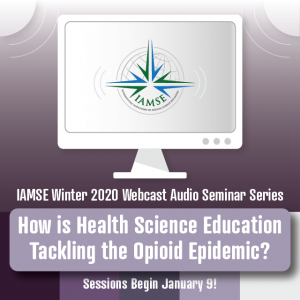
Join us every Thursday in January and the first Thursday in February for the IAMSE Winter 2020 Webcast Audio Seminar Series.
The theme for the Winter series is “How is Health Science Education tackling the Opioid Epidemic?” where we will feature several speakers from across the US. The Winter IAMSE web-based seminar series will provide a comprehensive synopsis of these efforts to respond to the opioid crisis.
As always, IAMSE Student Members can register for the series for FREE! Email support@iamse.org for more information.
Details about the series will be coming soon, so keep an eye on your inbox. For more details on the upcoming Winter 2020 series or our archives, please visit www.iamse.org.
Submit Your Manuscript to Medical Science Educator
Medical Science Educator, the peer-reviewed journal of the International Association of Medical Science Educators (IAMSE), publishes scholarly work in the field of health sciences education. The journal publishes four issues per year by Springer Publishing. We welcome contributions in the format of Short Communication, Original Research, Monograph, Commentary, and Innovation. Please visit our website www.medicalscienceeducator.org for a more detailed description of these types of articles.
I look forward to receiving your submissions.
Thank you,
Peter G.M. de Jong, PhD
Editor-in-Chief
#IAMSE20 Poster and Oral Abstract Submissions Due December 1
The International Association of Medical Science Educators (IAMSE) is pleased to announce the call for abstracts for Oral and Poster presentations for the 24th Annual IAMSE Conference to be held at the Hilton Denver City Center in Denver, CO, USA from June 13-16, 2020. The IAMSE meeting offers opportunities for faculty development and networking, bringing together medical sciences and medical education across the continuum of healthcare education.
Please click here to submit your abstract today.
Please note: The first time you enter the site, you will be required to create a user profile. Even if you did submit in previous years, you need to create a new account. All abstracts for Oral and Poster presentations must be submitted in the format requested through the online abstract submission site.
Students who would like feedback on a draft of their abstract prior to final submission should email it to the Student Professional Development Committee, care of Mary Dereski, by November 8, 2019.
Submission deadline is December 1, 2019.
Bonny Dickinson, PhD, MS-HPEd
Chair, 2020 Program Committee
IAMSE Fall 2019 WAS Session 5 Highlights
[The following notes were generated by Andrea Belovich, PhD.]
IAMSE Webinar Series, Fall 2019
Speaker: Valerie O’Laughlin and Teri Turner
Title: “Beyond See one, Do one, Teach one – Developing Trainees as Medical Educators”
Series: Re-imagining Faculty Development in Health Professions Education
The final installment of the IAMSE Fall 2019 Web Seminar series, “Re-imagining Faculty Development in Health Profession Education,” was presented on October 3rd by Valerie O’Loughlin PhD and Teri Turner MD, MPH, M.Ed. Dr. O’Loughlin is a Professor of Anatomy and Cell Biology and Assistant Director of Undergraduate Medical Education in the Medical Science program at Indiana University School of Medicine, and Dr. Turner is an Associate Professor, Associate Program Director of House Staff Education, and Vice-Chair of Education of the Pediatrics Department at Baylor College of Medicine. In this webinar, “Beyond See one, Do one, Teach one – Developing Trainees as Medical Educators,” Dr.’s O’Loughlin and Turner discussed the necessity, challenges, and strategies associated with training both graduate (PhD) students and residents to become future medical educators.
Dr. O’Loughlin began the seminar by discussing the need to train PhD graduate students as medical educators. As modern PhD programs continue to shift their focus towards molecular and cellular biology research, graduate expertise shifts away from the whole-organism knowledge needed to effectively teach a medical curriculum. This trend, combined with the retirement of existing faculty, is contributing to shortages of qualified educators in many disciplines, including Anatomy, Physiology, and Pharmacology. In addition, the retirement of experienced faculty and the growing number of medical programs being established underscores the need for future faculty who are well-versed in education methodologies, effective pedagogy, and assessment of curricular change. Since medical education is time-intensive and research faculty time is limited, the development of PhD-level training programs specific to Medical Education arises as a solution.
Elements of medical education training that can be incorporated into new or existing PhD programs include providing opportunities for developing teaching experience and discussions about pedagogy, learning theories, curricular development, and education frameworks. Consortia such as the Center for Integration of Research, Teaching and Learning (CIRTL) can provide resources and support for Medical Education training. The CIRTL consortium is comprised of numerous R1 institutions and provides tools such as online resources and classes, national meetings, and learning communities to promote graduate-through-faculty preparation for STEM teaching programs and the assessment of teaching as research.
As an example of a formal medical educator PhD programs, Dr. O’Loughlin presented the Education Track in Anatomy PhD at Indiana University School of Medicine1. Established in 2008, this program accepts 1-4 students per year and trains students in all of the anatomical disciplines essential to teaching undergraduate, graduate, and professional students. Coursework includes biomedical sciences, education and statistics, along with supervised teaching experiences in the anatomies (funded through graduate teaching assistantships). The research component and doctoral thesis is focused on a medical education or anatomy education topic and provides students with the skills to produce scholarship necessary for tenure and promotion. Graduates of the Education Track in Anatomy PhD program are in high demand, with many receiving job offers prior to graduation.
While Medical Educator PhD programs have demonstrated value, there are challenges to developing and implementing them. Perceptions of educational research as “non-science,” bureaucratic hurdles, availability of qualified advisors/mentors, and availability of funding to support graduate student training can be sources of resistance. However, using examples of successes of other programs and highlighting the rewards of such programs can help promote acceptance of Medical Education PhD programs, especially considering the desirability of graduates from these programs and their ability to serve in place of adjunct faculty during training. Emphasizing the research component of these programs can also demonstrate their value to institutions—PhD thesis projects can be used to evaluate institutional curricular reform and help advance the field of medical education.
After Dr. O’Loughlin addressed PhD Medical Education training programs, Dr. Turner discussed strategies and innovations in the training of residents as clinical faculty. These strategies leverage role-modeling and observational learning as effective teaching modalities in the clinic, as well as more formal teaching methods. Residents especially play a particularly important role in teaching medical students and need professional development both in being effective role models and in being effective educators.
Contrary to the notion that the teacher identity forms after the physician identity, a survey conducted by Dr. Turner and her colleagues suggested that the teacher identity forms earlier than previously thought (unpublished data). This supports the implementation of teaching experiences, rotations, and fellowships relatively early in training—even as early as the third year of medical school. Further examination of residents’ attitudes and motivations to teach also informs which approaches should be taken to provide training as medical educators. As a majority of residents are either intrinsically motivated to teach or wish to teach but view clinical duties as an external barrier to teaching, the focus of teaching programs should be on removing as many barriers as possible and providing professional development opportunities in teaching skills.
Best practices in developing medical education training programs for residents include the development of a year-long spiral curriculum rather than using a one-time workshop. Use of a logic model also helps to maintain the program’s focus by tracking objectives and competencies of the program, and provision of flipped classroom and practice applying learned principles is encouraged. Dr. Turner provided an extensive list of resources to aid in the development of a curriculum for training residents as teachers. Training programs can also offer electives, rotations, tracks, or degrees in medical education. As an example, Dr. Turner’s program offers a fellowship in Medical Education with the option to obtain an M.Ed. or equivalent.
Dr. Turner also provided a survey of innovative ideas for resident medical education training. Innovative motivation strategies include implementation of coached medical student teaching competitions, TED talk master classes, criterion-based and peer-reviewed membership in an Academy of Distinguished Resident Educators, and academic designation as “Clinical Instructors.” Mentored teaching approaches for junior learners such as “Teaching Up” and “Teaching Across” promotes confidence by teaching core knowledge “up” to more experienced learners and encouraging residents to teach “across” to other disciplines, medical professions, and community faculty. Role modeling and “near-peer” teaching has been observed to be effective in teaching, especially in terms of professionalism and quality improvement, as senior peers are viewed as approachable by their juniors, better able to understand their juniors’ perceptions, and can offer focused guidance.
Dr. Turner concluded the seminar with an emphasis on the importance of providing feedback as an integral part of learning and teaching. Techniques such as the objective structured teaching encounter (OSTE), observation checklists, audiotape or videotape teaching, and peer coaching are all helpful methods for evaluating teaching skills and providing feedback. Dr. Turner concluded with a list of evaluation tools and references, including several sources through the MedEdPORTAL and IAMSE designed for many different levels of learners.
References:
- Brokaw JJ, O’Loughlin VD. 2015. “Implementation of an education-focused PhD program in anatomy and cell biology at Indiana University: Lessons learned and future challenges.” Anat Sci Educ. 8:258-265.
